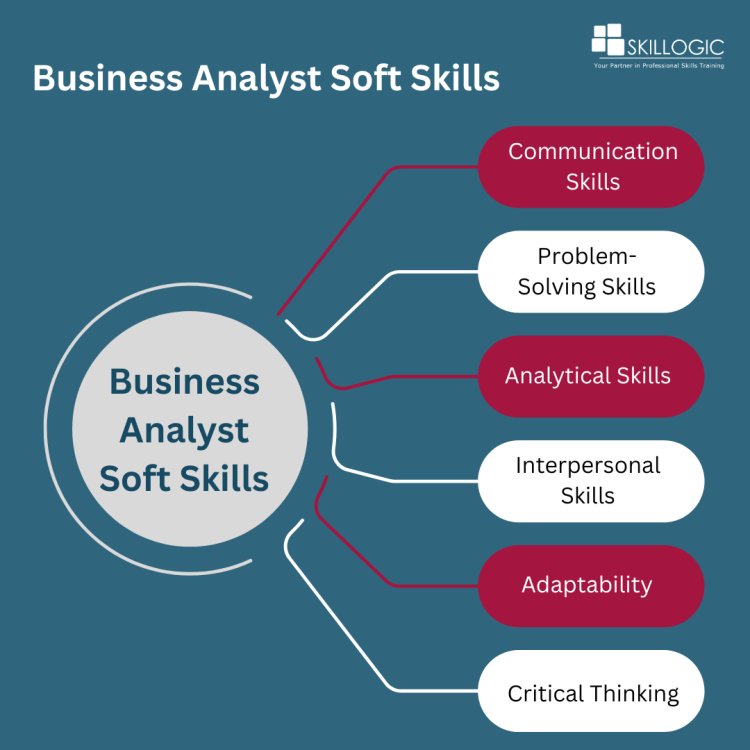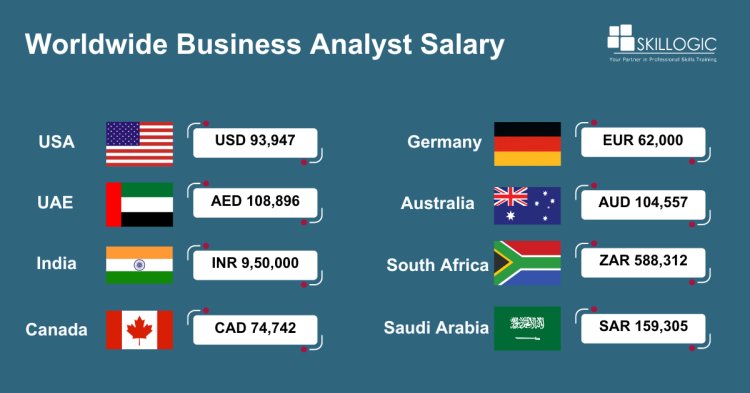The Essential Skills of a Business Analyst
A business analyst plays a key role in identifying business needs and solutions. This blog explores the essential skills required to excel in the field.

Business analysts are pivotal in enhancing organizational productivity and profitability. Their role demands a thorough grasp of the industry and specialized skills for success. Effective communication, problem-solving, negotiation, and attentive listening are crucial abilities sought by employers in prospective business analysts.
Based on findings from a Maximise Market Research study, the Business Analytics Market attained a value of around US$ 78.48 billion in 2022. Projections indicate a consistent annual growth rate of 7.5% from 2023 to 2029, leading to an estimated total revenue of nearly US$ 130.21 billion by the end of the forecast period. This article explores the indispensable skills necessary for business analysts to flourish in today's dynamic business landscape.
The Power of Business Analytics: A Comprehensive Guide
Business analytics is the process of utilizing data analysis and statistical techniques to uncover insights, trends, and patterns within a business's operations, performance, and market dynamics. By employing various tools and methodologies, organizations can make data-driven decisions to optimize processes, enhance efficiency, identify opportunities, and mitigate risks. Business analytics encompasses a wide range of activities, including data mining, predictive modeling, statistical analysis, and data visualization, ultimately aiming to drive better business outcomes and strategic planning.
Refer:
- Business Analyst Vs Business Analytics Expert
- Business Intelligence Vs Business Analytics – Comparison
- How To Become A Business Analytics Expert?
Decoding the Role of a Business Analyst: Core Responsibilities Unveiled
A business analyst is a professional who acts as a bridge between business stakeholders and IT teams, analyzing processes, gathering requirements, and designing solutions to address business challenges. They utilize data analysis, critical thinking, and communication skills to identify opportunities for improvement and recommend strategies for enhancing organizational efficiency and effectiveness. Through collaboration with various stakeholders, they facilitate the implementation of solutions that align with the company's goals and objectives, ultimately driving growth and success. Their core responsibilities typically include:
Core Responsibilities of Business Analysts in Business Analytics
Identifying Business Needs and Analytical Goals
- Stakeholder Engagement: Collaborating with stakeholders to understand their business challenges and objectives.
- Defining Analytical Goals: Establishing clear, measurable goals for analytical projects that align with business priorities.
- Requirement Gathering: Collecting detailed business requirements to ensure analytics projects address the right questions.
Data Collection and Preparation
- Data Sourcing: Identifying and sourcing relevant data from internal and external databases, ensuring data quality and relevance.
- Data Cleaning and Transformation: Preparing data for analysis by cleaning, transforming, and integrating it into a usable format.
- Data Governance: Ensuring data privacy, security, and compliance with relevant regulations.
Data Analysis and Interpretation
- Exploratory Data Analysis (EDA): Conducting initial analyses to uncover preliminary insights and inform the direction of deeper investigations.
- Advanced Analytics: Utilizing statistical methods and predictive models to analyze data and generate actionable insights.
- Trend Analysis: Identifying trends, patterns, and anomalies that can impact business decisions.
Visualization and Communication of Insights
- Data Visualization: Creating visual representations of data using tools like Tableau, Power BI, or custom dashboards to make insights accessible and understandable.
- Reporting: Developing comprehensive reports that summarize analytical findings and their implications for the business.
- Presentation: Effectively communicating insights to stakeholders through presentations and data storytelling, ensuring that complex data is translated into clear, actionable recommendations.
Strategy Development and Implementation
- Actionable Recommendations: Providing strategic recommendations based on analytical findings to drive business improvement.
- Implementation Support: Assisting in the implementation of data-driven strategies, ensuring that insights are translated into tangible actions.
- Performance Monitoring: Tracking the impact of implemented strategies and refining them based on ongoing data analysis.
Continuous Improvement and Innovation
- Feedback Loops: Establishing feedback mechanisms to continuously learn from implemented strategies and refine analytical approaches.
- Staying Current: Keeping up-to-date with the latest trends, tools, and techniques in business analytics to ensure the organization remains competitive.
- Innovation: Driving innovation by identifying new opportunities for leveraging data to enhance business performance.
What Are Business Analyst Skills?
The skills of business analysts enable them to visualize and analyze intricate problems, effectively organize processes, and devise solutions that spark innovation. These abilities are instrumental in enhancing an organization's profitability, efficiency, and productivity. Business analyst skills encompass leveraging available data to derive informative insights crucial for making strategic business decisions. Employers prioritize candidates with exceptional business analyst skills both technical and soft due to their pivotal role in driving a company's success.
Employers seek candidates with technical skills for business analysis, including:
Data Analysis: Proficiency in using tools like Excel, SQL, or business intelligence (BI) software to analyze data, identify trends, and extract insights that can inform business decisions.
Statistical Analysis: Understanding of statistical methods and tools for conducting advanced data analysis, such as hypothesis testing, regression analysis, and predictive modeling.
Data Visualization: Ability to create visually appealing and informative charts, graphs, and dashboards using tools like Tableau, Power BI, or Python libraries like Matplotlib and Seaborn.
Database Management: Knowledge of database concepts and experience working with databases to extract, manipulate, and analyze data. Familiarity with database querying languages like SQL is essential.
Process Modeling and Design: Ability to map out and analyze business processes using techniques like process modeling notation (e.g., BPMN) and identify opportunities for improvement.
Prototyping and Wireframing: Skill in creating prototypes, mockups, and wireframes to visually represent user interfaces and system functionality, often using tools like Axure, Balsamiq, or Sketch.
Software Development Life Cycle (SDLC): Understanding of software development methodologies such as Agile, Waterfall, or DevOps, and experience working within these frameworks to deliver projects.
Quality Assurance and Testing: Knowledge of testing principles and techniques to ensure the quality and reliability of software solutions. This includes writing test cases, conducting testing, and tracking defects.
Documentation and Communication: Strong written and verbal communication skills are crucial for documenting requirements, presenting findings, and facilitating communication between stakeholders, developers, and other team members.
Refer:
- Business Analytics Expert in India
- Business Analytics Course Fee in India
- Business Analytics Scope in India
Business Analyst Soft Skills:
Communication Skills: Effective communication is essential for business analysts to interact with stakeholders at all levels of the organization. They must be able to articulate their findings, present recommendations, and facilitate discussions to ensure that everyone understands the proposed solutions and their implications.
Problem-Solving Skills: Business analysts encounter various challenges while analyzing business processes and requirements. They need excellent problem-solving skills to approach issues creatively, think critically, and develop innovative solutions that address the needs of the organization.
Analytical Skills: Business analysts need strong analytical skills to understand complex systems, processes, and data. They should be able to break down problems into manageable components and analyze them systematically to identify root causes and propose solutions.
Interpersonal Skills: Building relationships and fostering collaboration are essential aspects of the business analyst role. Business analysts must be able to work effectively with diverse stakeholders, including executives, managers, subject matter experts, and IT professionals, to gather information, resolve conflicts, and drive consensus.
Adaptability: The business environment is constantly evolving, and business analysts must be adaptable to change. They should be open to new ideas, willing to learn new skills, and able to adjust their approach as project requirements and priorities shift.
Critical Thinking: Business analysts need strong critical thinking skills to evaluate information objectively, challenge assumptions, and make informed decisions. They should be able to weigh the pros and cons of different options and assess the potential impact of their recommendations on the organization.

Strengthen Your Business Analysis Skills: A Step-by-Step Guide
Understand the Role: Make sure you have a clear understanding of what a business analyst does. This includes gathering and analyzing business requirements, facilitating communication between stakeholders, identifying problems and opportunities, and proposing solutions.
Learn Business Analysis Techniques: Familiarize yourself with various business analysis techniques such as SWOT analysis, PESTLE analysis, stakeholder analysis, process modeling, data analysis, and requirements elicitation techniques.
Get Formal Education: Consider pursuing formal education in business analysis. Many universities and colleges offer degree programs, certifications, or courses specifically in business analysis or related fields like management information systems.
Gain Experience: Look for opportunities to gain hands-on experience. This could involve working on projects within your current organization, volunteering for business analysis tasks, or seeking internships or entry-level positions in business analysis.
Networking: Connect with other business analysts through professional associations, online forums, and networking events. This can help you learn from others' experiences, stay updated on industry trends, and potentially find mentors who can provide guidance and advice.
Develop Soft Skills: In addition to technical skills, focus on developing soft skills such as communication, problem-solving, critical thinking, and teamwork. These skills are essential for effective business analysis.
Stay Updated: The field of business analysis is constantly evolving, so make sure to stay updated on the latest tools, techniques, and trends. This could involve attending conferences, workshops, webinars, or participating in online communities.
Refer:
- Business Analytics Course Fee in Bangalore
- Business Analytics Course Fee in Hyderabad
- Business Analytics Course Fee in Pune
Worldwide Business Analyst Salary Trends:
- The salary of a business analyst in the USA averages USD 93,947 per year according to a Glassdoor report.
- The salary of a business analyst in the UAE averages AED 108,896 per year according to an Indeed report.
- The salary of a business analyst in India averages INR 9,50,000 per year according to a Glassdoor report.
- The salary of a business analyst in Canada averages CAD 74,742 per year according to a Glassdoor report.
- The salary of a business analyst in Germany averages EUR 62,000 per year according to a Glassdoor report.
- The salary of a business analyst in Australia averages AUD 104,557 per year according to an Indeed report.
- The salary of a business analyst in South Africa averages ZAR 588,312 per year according to an Indeed report.
- The salary of a business analyst in Saudi Arabia averages SAR 159,305 per year according to a PayScale report.

Successful business analysts possess a blend of both hard and soft skills. Enhancing your technical capabilities alongside refining your interpersonal abilities can significantly contribute to your effectiveness in this role. In various industries such as IT and e-commerce, companies are willing to offer competitive compensation packages to individuals who can bring substantial value to their organization.
Prospective business analysts can enrich their knowledge and skills through various educational avenues, including reputable institutions like SKILLOGIC®. Renowned as a leading international training provider, SKILLOGIC® institute offers specialized certification programs covering a broad spectrum of disciplines such as Project Management, Quality Management, Cyber Security, Software Development, and Business Analytics. With over a decade of experience, SKILLOGIC® stands as a symbol of excellence, catering to a diverse global community of over 100+ learners. Their extensive offerings include more than 25 accreditations and partnerships, supported by a dedicated team of over 100 experienced instructors.
SKILLOGIC provides expert-led certification courses in Six Sigma, PMP, Cybersecurity, and Business Analytics. Known for delivering high-quality training, it offers practical industry insights. With over a decade of experience, SKILLOGIC's Business Analyst course is available in offline mode across major cities like Bangalore, Chennai, Pune, and Hyderabad, ensuring accessible learning throughout India.

0
730